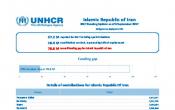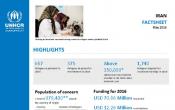Islamic Republic of Iran
Operation: Islamic Republic of Iran
Location
{"longitude":55,"latitude":33,"zoom_level":5}
Latest update of camps and office locations 21 Nov 2016. By clicking on the icons on the map, additional information is displayed.
Key Figures
| 2016 end-year results | |
| 145,200 | refugees were enrolled in the national health insurance scheme, out of whom over 117,000 were vulnerable refugees |
| 412 | students were supported with DAFI scholarships |
| 16 | schools were constructed |
| 2016 planning figures | |
| 157 | health facilities equipped/constructed/rehabilitated |
| 24 | educational facilities constructed or improved |
| 3,500 | people of concern enrolled in formal national institutions for certified skills training |
| 6,000 | people of concern receiving legal assistance |
Latest Updates
People of Concern
0%
Increase in
2016
2016
| 2016 | 979,537 |
| 2015 | 979,491 |
| 2014 | 982,085 |

[["Refugees",979435],["Asylum-seekers",91],["Returned refugees",11]]
Loading ...
Islamic Republic of Iran
< Back
2016
{"categories":[2012,2013,2014,2015,2016,2017],"budget":[53.22125512,59.5882886,68.48044209,72.823781737,76.76538033,97.24654417],"expenditure":[30.85165641,38.43715452,30.14519856,21.93132368,36.211779,null]}
{"categories":[2012,2013,2014,2015,2016,2017],"p1":[53.22125512,59.5882886,68.48044209,72.823781737,76.76538033,97.24654417],"p2":[null,null,null,null,null,null],"p3":[null,null,null,null,null,null],"p4":[null,null,null,null,null,null]}
{"categories":[2012,2013,2014,2015,2016,2017],"p1":[30.85165641,38.43715452,30.14519856,21.93132368,36.211779,null],"p2":[null,null,null,null,null,null],"p3":[null,null,null,null,null,null],"p4":[null,null,null,null,null,null]}
Loading ...
CHOOSE A YEAR
- 2014
- 2015
- 2016
- 2017
Working environment
In 2016, the Islamic Republic of Iran remained the world’s fourth largest refugee-hosting country, with one of the largest and most protracted Afghan refugee populations.In the Islamic Republic of Iran, great strides have been made to enhance refugee access to health care and education.
In September 2016, the second phase of the implementation of the national universal public health insurance scheme was launched. Access to this scheme helps address the health needs of refugees as well as financial challenges.
The authorities continued to implement the 2015 decree by the Supreme Leader allowing undocumented children to enroll in local schools. In the course of the year, the Government of the Islamic Republic of Iran also revised regulations on the registration of foreign national students resulting in the removal of refugee-specific tuition fees for primary and secondary education.
The number of refugees who chose to voluntarily repatriate continued to be low. A total of 788 refugees departed for resettlement to third countries.
Population trends
- According to the government authorities, the Islamic Republic of Iran hosted approximately 979,000 refugees, including more than 951,000 Afghans and over 28,000 Iraqis.
- 97 per cent of refugees live in urban areas while 3 per cent reside in the 20 settlements.
- Close to 2,300 Afghan refugees and 128 Iraqi refugees voluntarily repatriated to their respective countries of origin.
Achievements and impact
- In 2016, UNHCR focused on youth empowerment by providing support to refugee communities and by contributing to education, self-reliance and livelihoods opportunities within the framework of the regional “Solutions strategy for Afghan refugees so support voluntary repatriation, sustainable integration and assistance to host countries” (SSAR) and the “UNHCR regional plan ‘on building resilience and solutions for Afghan refugees in South-West Asia’’.
- UNHCR worked with the Government of the Islamic Republic of Iran to ensure refugee access to its universal health insurance scheme. The Office contributed to the Government’s efforts by covering the insurance premium for vulnerable refugees.
- UNHCR collaborated with the Ministry of Education to build additional schools and classrooms in order to increase enrolment of refugees and undocumented Afghans to primary and secondary education. Following the Supreme Leader’s decree in May 2015, some 52,000 undocumented Afghan children were enrolled in the national education system for the 2016-2017 year.
- UNHCR, together with the authorities, expanded its community outreach leading to the improved identification of people with specific needs and to the improvement of referral mechanisms.
- UNHCR established and led the inter-agency Cash Working Group, in order to ensure efficient and coordinated cash-based interventions.
Unmet needs
- Given limited resources, UNHCR was only able to support the construction of 16 out of 30 schools that were initially planned for the year.
- The number of refugees with specific needs who received cash assistance was limited due to budgetary constraints.
- UNHCR was able to provide support to only 117,500 vulnerable refugees in order to ensure access to the national health insurance scheme, while many other refugees faced financial challenges as they were required to pay the insurance premium.
The Islamic Republic of Iran was the world’s fourth largest hosting country of refugees under UNHCR’s mandate in 2014. There are 982,000 refugees in the country – including over 951,000 Afghan and 28,000 Iraqi refugees, according to the Government’s 2013 registration data. Ninety-seven per cent of refugees reside in urban settings, while the remainder are in settlements.
The Islamic Republic of Iran has been hosting and providing protection and assistance to Afghan refugees for over 30 years. Despite the political and socio-economic challenges, the Government has demonstrated solidarity, including through significant efforts to provide Afghan refugees with education, healthcare and livelihood opportunities. The Office welcomes the decision by the Government of the Islamic Republic of Iran to include refugees in the universal national health insurance scheme.
In 2016, together with the Government, UNHCR will continue focusing its programmes on health, education and livelihoods, aimed at empowering refugees to contribute to reconstructing Afghanistan and facilitating their reintegration upon eventual return. Youth empowerment will continue to be a programme focus. The Office will support the implementation of the Iran Portfolio of Projects developed within the regional Solutions Strategy for Afghan Refugees to Support Voluntary Repatriation, Sustainable Reintegration and Assistance to Host Countries and approved by the National Steering Committee.




